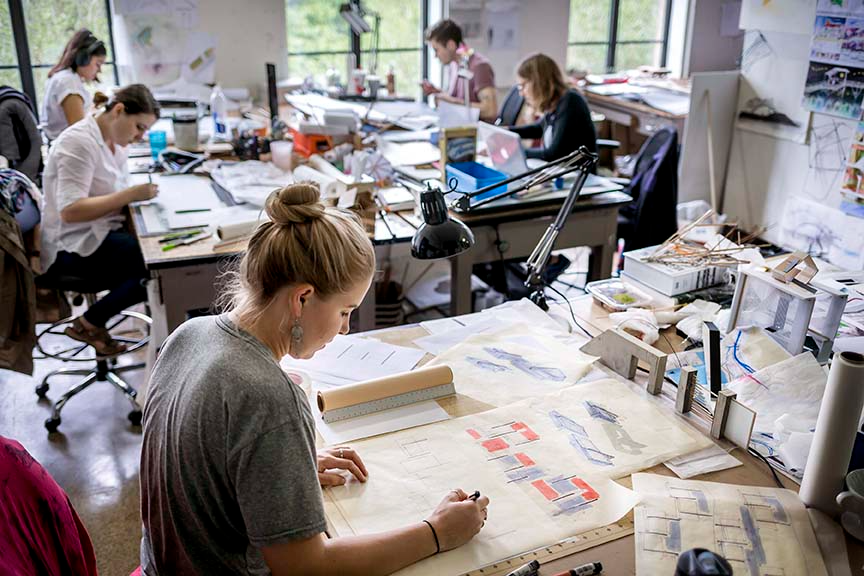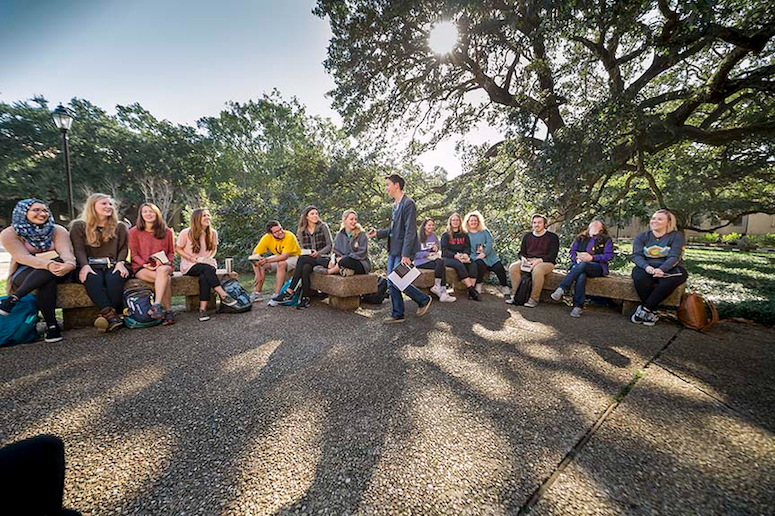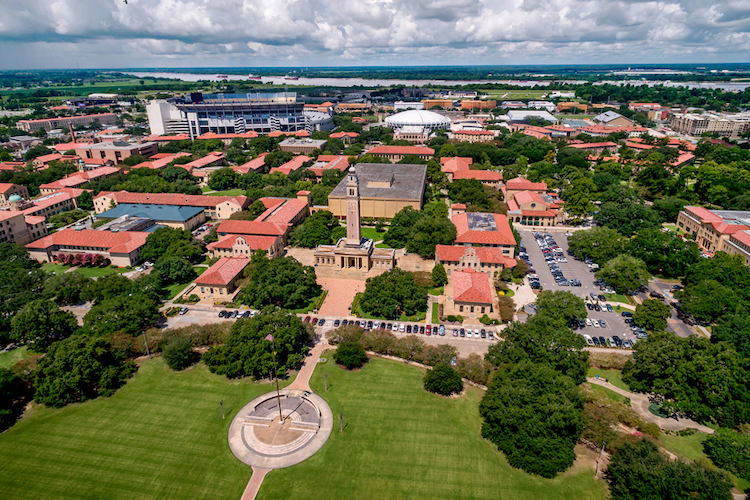Geaux Communicate QEP
Effective communication is vital to teaching and learning. This is why, as part of LSU’s Quality Enhancement Plan, the university is expanding its award-winning communication-intensive programming across the campus through the Geaux Communicate initiative. LSU’s goal with this initiative is for all undergraduate students—regardless of their major—to have access to communication-intensive classes and learning support services that will set them up for success, and we will be expanding support for our teaching faculty who will be at the forefront of making this happen.

Undergraduate Students
Regardless of your major, no matter if this is your first or last semester, and whether you need a little or a lot of support, there are several enhanced and expanded opportunities to help you Geaux Communicate while earning your degree at LSU.
WHAT DOES GEAUX COMMUNICATE MEAN FOR UNDERGRADUATE students?

Undergraduate Teaching Faculty
Whether you've been teaching communication-intensive (C-I) courses for years, you're a newcomer to the high-impact practice, or you aren't sure if C-I is right for your course, Geaux Communicate will provide lots of opportunities and resources to help students develop their communication skills while at LSU.
WHAT DOES GEAUX COMMUNICATE MEAN FOR UNDERGRADUATE teachers?

Geaux Communicate Quality Enhancement Plan (QEP) Details
LSU is accredited through the Southern Association of Colleges and Schools Commission on Colleges (SACSCOC). A key part of the reaffirmation of accreditation requires institutions to develop and implement implement a five year Quality Enhancement Plan (QEP) to demonstrate their commitment to student learning and success.
Geaux Communicate is Louisiana State University and Agricultural & Mechanical College’s
(LSU A&M) 2024–2029 Quality Enhancement Plan (QEP), which focuses on advancing the multimodal communication skills of all LSU undergraduates (online and
on-campus) by enhancing and expanding Communication-Intensive
(C-I) teaching and learning.
Communication-Intensive (C-I) pedagogy is a high-impact teaching approach that integrates
course-based subject matter with communication-based activities, simultaneously deepening
students’ content learning and advancing their communication skills. This contemporary
pedagogy originated as part of LSU’s inaugural QEP (2004-2009), and 15 years of longitudinal
data show C-I Courses positively influence undergraduate student learning and overall
success from matriculation to graduation, confirming its efficacy
as a high-impact teaching and learning practice (HIP) at LSU.
Communication skills are essential for all disciplines, fields, industries, and job
roles, making this topic relevant to all majors and a vital component of college teaching,
student learning, and post-graduation success. Advancing students’ multimodal communication
skills has become an institutional priority as demonstrated in LSU’s general education
program, which includes proficiencies in written and oral communication skills. Additionally,
employing relevant HIPs is a focus of the Louisiana Board of Regents’ new agenda to
advance
student success inside the classroom and beyond.
The Geaux Communicate QEP was developed as part of LSU’s ongoing institutional planning and through campus-wide collaborations. It applies a whole-systems approach to strategically enhancing and scaling up LSU’s existing C-I programming as a high-impact pedagogical intervention via new and increased resources accessible to LSU’s 30,000 undergraduates.
Geaux Communicate centers on four student learning and success outcomes. Three program-level
outcomes were also established to support the achievement of these student learning
and success outcomes and to guide the long-term success of this QEP. The
implementation of Geaux Communicate prioritizes expanding, creating, and enhancing support and resources
in two key areas: (1) C-I faculty training and recognition opportunities, and (2)
in- and out-of-class C-I student learning support and recognition opportunities. Practical and meaningful assessment approaches have been identified to assess the
seven outcomes at both formative and summative stages.
The Geaux Communicate initiative is strategically designed to maximize existing resources and allocate new resources to create and enhance sustainable C-I programming that will support teaching and learning excellence across the Institution throughout this five-year QEP and well beyond.
View student success & learning outcomes and Program-level outcomes
Communication-intensive (C-I) pedagogy is a high-impact teaching approach that integrates course-based subject matter with communication-based activities, simultaneously deepening students’ content learning and advancing their communication skills. Past research suggested a positive correlation between participation in LSU C-I Courses and graduation. A recent study expanded this work with additional cohort data and explored the following research questions:
- Is participation in C-I Courses a predictor of graduation at LSU? Does the positive correlation found in the 2012 cohort hold true across other LSU undergraduate cohorts?
- Does participation in 1 or 2 LSU C-I Courses show similar correlations to 3 or more LSU C-I Courses?
- To what extent is C-I a significant predictor of graduation at LSU specifically for low-income (Pell) students?
Using a whole-systems approach, this QEP aims to strategically advance and scale up LSU’s existing Communication-Intensive (C-I) programming as a high-impact pedagogical practice (HIP) and intervention and enhancement for undergraduate education across the disciplines.
Developing the Geaux Communicate QEP throughout the past two years has been a collective effort. The individuals listed below have been key contributors to the development of the QEP, and we thank them for all of their hard work and commitment to the milestone of formally moving Geaux Communicate from proposal stage into implementation.
| Name | College/Department |
|---|---|
| Aly Mousaad Aly | College of Engineering |
| Jackie Bach | Office of Academic Affairs/College of Human Sciences & Education |
| Isabella Badeau* | College of Art & Design |
| Jahanna Bailey | College of Human Sciences & Education |
| Negar Basiri | CxC |
| Jennifer Baumgartner | CxC/College of Human Sciences & Education |
| Inessa Bazayev | College of Music & Dramatic Arts |
| Michael Bibler | College of Humanities & Social Sciences |
| Boz Bowles | CxC/College of Engineering |
| Ryan Bromfield* | College of Engineering |
| Rebecca Burdette | CxC/College of Business |
| Becky Carmichael | CxC/College of Agriculture/College of Coast & Environment/College of Science |
| Jane Cassidy | Office of Academic Affairs/College of Music & Dramatic Arts |
| Wen-Chieh Fan | LSU Online |
| Chelsea Chisolm* | Manship School of Mass Communication |
| Morgan Claybrooks* | Manship School of Mass Communication |
| Ashley Clayton | College of Human Sciences & Education |
| Tori Clement | CxC/LSU Discover |
| Gabrielle Connor* | College of Humanities & Social Sciences |
| Vic Cronan* | College of Human Sciences & Education |
| Erica Daigle | Emerging Technology Center |
| Simmion Demery* | College of Art & Design |
| Mike Dettinger | College of Humanities & Social Sciences |
| Kevin DiBenedetto | CxC |
| Nnenna Eke* | College of Engineering |
| Lora Eliott | College of Engineering |
| Nick Erickson | College of Music & Dramatic Arts |
| Mikayla Foster* | College of Agriculture |
| Annemarie Galeucia | CxC/Ogden Honors College |
| Fern Galvez | College of Science |
| Ashley Grant | College of Agriculture |
| Janene Grodesky | College of Human Sciences & Education |
| Aimee Guillory* | College of Engineering |
| Stephanie Hailes* | Manship School of Mass Communication |
| Hannah Hauck* | College of Humanities & Social Sciences |
| Darrell Henry | College of Science |
| Stephanie Heumann | College of Engineering |
| Matthew Hiatt | College of the Coast & Environment |
| Jeannie Hopper | Residential Life |
| Liam Hopper* | College of Art & Design |
| Josef Horáček | CxC/College of Art & Design |
| Tim Hoskins* | College of Music & Dramatic Arts |
| Michael Jarvis* | College of Agriculture |
| Jake Jeandron* | College of Engineering |
| Mike Kaller | College of Agriculture |
| Corrie Kiesel | College of Humanities & Social Sciences |
| Drew Lamonica Arms | Ogden Honors College |
| Roman Landry* | College of Art & Design |
| Matt Lee | College of Agriculture |
| Kris Lindsey Hall | E.J. Ourso College of Business |
| Elise Lipari* | E.J. Ourso College of Business |
| Amy Luther | College of Science |
| Kristen Mauch | College of Art & Design |
| Erin McKinley | College of Agriculture |
| Morgan Miller* | College of Agriculture |
| Mary Moore* | College of Music & Dramatic Arts |
| Ese Mukoro* | Ogden Honors College/E.J. Ourso College of Business |
| Dami Olorunfemi* | E.J. Ourso College of Business |
| Rafael Orozco | College of Humanities & Social Sciences |
| Kate Pettrey | College of Engineering |
| Tucker Poret* | College of Engineering |
| Lillian Powell* | CxC/College of Science |
| ReRe Pride-Shaw | College of Humanities & Social Sciences |
| Sybil Pun* | College of Engineering |
| Luisa Restrepo Perez | College of Art & Design |
| Johnna Roose | College of Science |
| Tara Rose | Office of Institutional Effectiveness |
| Christina Rothenbeck | CxC/Ogden Honors College |
| Claire Sassic Young | Office of Institutional Effectiveness |
| Helmut Schneider | E.J. Ourso College of Business |
| Andy Schwarz | E.J. Ourso College of Business |
| Lea Showers* | College of Art & Design |
| Brandi Simmons | CxC |
| Storm Spell* | College of Agriculture |
| Michelle Spielman | Office of Communications & University Relations |
| Anna Catherine Strong* | Student Government/College of Humanities & Social Sciences |
| Malinda Sutor | CxC/College of Human Sciences & Education/College of Humanities & Social Sciences/Ogden Honors College |
| Avery Thomas* | CxC/College of Humanities & Social Sciences |
| Shanai Watson* | CxC/College of Humanities & Social Sciences |
| Laura Wiley | E.J. Ourso College of Business |
| Sadie Wilks | Manship School of Mass Communication |
| Shania Winchester* | CxC/College of Humanities & Social Sciences |
| Jason Wolfe | College of Humanities & Social Sciences |
* indicates student representative
Below is more information about LSU’s QEP efforts. This page is being continuously updated, so if you have a question that isn’t answered here, send it to us at cxc@lsu.edu.
LSU is accredited through the Southern Association of Colleges and Schools Commission on Colleges (SACSCOC). A key part of the reaffirmation of accreditation requires institutions to develop and implement a Quality Enhancement Plan (QEP) every five years to demonstrate their commitment to academic excellence and student learning and success. You can learn more about LSU’s comprehensive SACSCOC reaffirmation processes here.
Being able to effectively communicate is a skill that transcends any single field. It enables us to find, acquire, share, and apply knowledge. However, being able to effectively communicate is not a trait we are simply born with—it is a learned skill and one that is more important than ever given the rapidly evolving nature of our world. Communication skills are also among the top skills and competencies ranked by hiring managers across a variety of public and private sectors.
While the specificity of what qualifies as effective communication can differ across disciplines, overarching themes include being able to successfully articulate ideas and knowledge through written, spoken, visual, and technological forms. That could range anywhere from delivering a comprehensive project pitch or collaborating on a research funding proposal to authoring industry-specific reports or producing data visualizations for public audiences. These are the types of multimodal communication projects that many LSU faculty are integrating into their teaching to help students better learn, communicate, and apply course content within and beyond the classroom.
Undergraduate communication skills development was selected as the QEP topic based on evidence demonstrated via LSU’s strategic priorities, analysis of assessment findings, and exploratory activities with various constituent groups conducted in the 2022 Spring and Summer semesters. As a nationally recognized leader in communication-intensive teaching and learning, we have a strong foundation on which we are building and expanding across the campus.
As a teacher of a certified C-I course you are a valued member of the LSU CxC family. We see you and appreciate your efforts, energy and intention. Our hope is that this, QEP will provide new and enhanced opportunities to support and celebrate the good work you are already doing. As a champion for C-I teaching on this campus, you may be asked to share your expertise with colleagues as we continue to extend communication-intensive experiences across the campus to all LSU undergraduate students.
While Communication-Intensive (C-I) pedagogy at LSU is a demonstrated high-impact teaching practice, it is not the best approach for every undergraduate course. If C-I isn’t the right fit for your course content or your instructional approach, that’s okay. While you may not be teaching a certified C-I course, you likely do many things to help students learn about and practice communication, and you can encourage your students to seek the free support services available to all LSU undergraduates via the CxC Studios. If you’re unsure whether C-I is a good fit for you or you want to learn more about what resources are available to your students and how you can leverage them, reach out to the CxC Team.
LSU is committed to helping students to achieve the highest levels of intellectual and personal development. Regardless of your chosen degree path or life plan, effective communication will be at the forefront of your journey. Research from the American Association of Colleges and Universities, the National Association of Colleges and Employers, and the World Economic Forum (just to name a few) shows just how in-demand communication skills are across fields, industries, sectors, and global regions. This is why LSU will be enhancing and expanding free resources and opportunities to help all LSU undergraduates advance their communication skills inside and outside of the classroom.
Whether you realize it or not, you play a critical role in the skills development of undergraduate students across campus. Through this initiative, you will have the opportunity to build on those outcomes with intentional collaboration across departments, and to work alongside fellow staff and faculty members with the unifying goal of ensuring LSU students have the tools they need to cultivate their communication skills within the classroom and beyond.